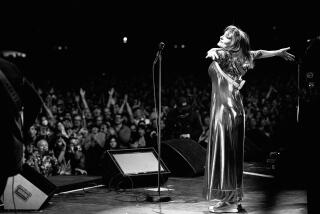POP MUSIC REVIEW : Band Evokes Orwellian World : Nitzer Ebb Produces Harsh, Industrial-Strength Techno-Rock Sounds at Club Postnuclear
- Share via
British techno-rock bands tend to be a Jekyll and Hyde bunch that can be found vacillating between darkly ironic languor and chirpy, pepped-up pop.
Wednesday night at Club Postnuclear in Laguna Beach, Nitzer Ebb’s version of British techno-rock couldn’t have been further from that (Depeche) mode. The trio with the nonsense name played “industrial” dance music that was bluntly emphatic rather than ironic. As for chirpy pop--well, Nitzer Ebb (the “i” is pronounced long, as in ‘night’) sounded about as chirpy and pop-ish as a drill press.
A more appropriate British literary reference here would be H.G. Wells’ futuristic science-fiction novel “The Time Machine.” Its villains are a horrific race of industrial gnomes known as the Morlocks, who dwell underground, operating sinister machinery and cannibalizing the innocent flower children who live in the sunlight. With its clanging, synthesized beats and hypnotically repeated chants full of fear and loathing, Nitzer Ebb played Morlock rock that frequently suggested totalitarian imagery.
For ears that thrive strictly on melody, the concert might have seemed like an hour in hell. Singer Douglas McCarthy ranted fragmentary tirades in a rasping, guttural voice. His songwriting partner, percussionist Bon Harris, and guest drummer Julian Beeston hammered away on electronic drums to produce crashing, metallic beats. Pre-programmed backing tracks added little in the way of melody or softening texture. Musical variety consisted of a choice between fast and slow, dark and not-quite-so-dark.
Still, this was an interesting show, thanks largely to McCarthy’s athletic, pumped-up performing style and the punk-influenced fervor of his yowling. With short, tousled hair, angular looks and jerk-to-the-beat movements, he resembled Mark Mothersbaugh of Devo, minus Mothersbaugh’s way of sweetening technological music with pop hooks. At peak moments, when fast, surging beats took hold and had some of the dancers in the audience leaping and bobbing, Nitzer Ebb generated a fascinating turbulence.
The music also posed some interesting paradoxes. This was openly mechanized sound, with each song locked into the structure and time dictates of the assembly line. With McCarthy barking what often sounded like commands against this harsh sonic backdrop, Nitzer Ebb evoked a dehumanized, Orwellian world. Yet, McCarthy’s thrashing, sweaty movements and the desperate energy of his howling conveyed a sense of rebellion--perhaps doomed--against mechanized musical bonds and totalitarian means of social control.
In its most positive song, “Let Your Body Learn,” Nitzer Ebb boasted that its mechanical sound could offer “freedom from fear, giving release.” That’s a strange claim for music that so often conjured up chilling images. But it was music that also kept the audience moving, responding and singing back phrases.
So Nitzer Ebb’s industrial hammering did allow a listener some freedom of choice: It could paralyze the mind and motivate the body or it could invite speculation about the paradox of modern technology, which has the potential both to enslave and to liberate. Not a bad evening’s work for a band you couldn’t hum along to.
More to Read
The biggest entertainment stories
Get our big stories about Hollywood, film, television, music, arts, culture and more right in your inbox as soon as they publish.
You may occasionally receive promotional content from the Los Angeles Times.








